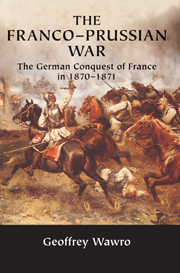Book contents
- Frontmatter
- Contents
- List of Abbreviations
- List of Illustrations
- Acknowledgments
- Introduction
- 1 Causes of the Franco-Prussian War
- 2 The Armies in 1870
- 3 Mobilization for War
- 4 Wissembourg and Spicheren
- 5 Froeschwiller
- 6 Mars-la-Tour
- 7 Gravelotte
- 8 The Road to Sedan
- 9 Sedan
- 10 France on the Brink
- 11 France Falls
- 12 The Peace
- Bibliography
- Index
6 - Mars-la-Tour
Published online by Cambridge University Press: 20 July 2009
- Frontmatter
- Contents
- List of Abbreviations
- List of Illustrations
- Acknowledgments
- Introduction
- 1 Causes of the Franco-Prussian War
- 2 The Armies in 1870
- 3 Mobilization for War
- 4 Wissembourg and Spicheren
- 5 Froeschwiller
- 6 Mars-la-Tour
- 7 Gravelotte
- 8 The Road to Sedan
- 9 Sedan
- 10 France on the Brink
- 11 France Falls
- 12 The Peace
- Bibliography
- Index
Summary
As Bismarck had anticipated, France's potential allies in Europe were the first to blench at the news of Spicheren and Froeschwiller. Stunned by the speed of the Prussian attacks, first the Austrians, then the Italians, and finally the Danes stood down, quietly refusing to intervene in a war that the Prussians now looked certain to win. French citizens, fooled by censorship and wild rumors, reacted less surely. Indeed on the day of Spicheren and Froeschwiller, two French swindlers were able to perpetrate a sensational hoax. As crowds of Parisians surged around the Bourse awaiting war news that they assumed would be delivered first to the stock exchange “for the benefit of money-changers and speculators,” one of the two swindlers stationed himself in the entrance of the Bourse while the other, disguised as a courier, rode a lathered horse through the crowd, waving a paper and shouting “official dispatch!” The two accomplices met and the well-dressed one, posing as a spokesman for the Bourse, shouted the “war news” at the top of his lungs: “There has been a great battle, a great French victory, 25,000 Prussians have been captured, including the crown prince and forty guns.”
Elihu Washburne, the U.S. ambassador to France, noted that “a spark of fire falling upon a magazine could not have produced a greater explosion.” The crowd went mad; people clasped one another, kissed, danced, and sang.
- Type
- Chapter
- Information
- The Franco-Prussian WarThe German Conquest of France in 1870–1871, pp. 138 - 163Publisher: Cambridge University PressPrint publication year: 2003

